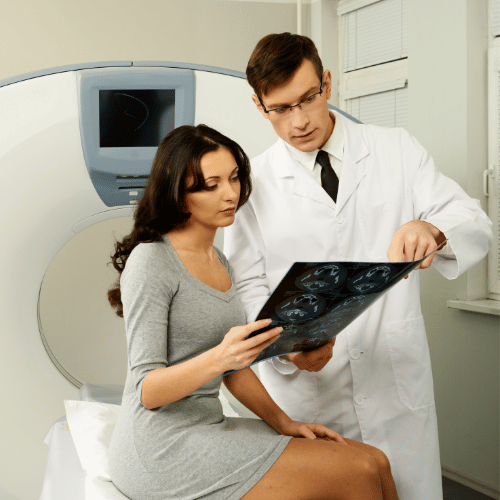
Medical Weight Loss Explained
A lot is said about medical weight loss but we are here to debunk the myths for you.
Cardiology > Cardiac CT

Find Out More


A cardiac CT scan, also known as CT coronary angiography or computed tomography, is an X-ray-based imaging test that provides a detailed view of your heart and surrounding blood vessels.
Performed by a cardiologist, this painless procedure helps assess your heart health and guide the development of an appropriate treatment plan.

A Cardiac CT scan combines X-ray technology with computer processing to create high-resolution images, allowing us to see the intricate structures of your heart in exceptional detail. It can be used to augment other diagnostic findings, evaluate your risk for developing coronary heart disease, and check any grafts implanted during previous heart bypass surgery.
Unlike a full-body CT scan, your head remains outside of the scanner during the process, which means you are unlikely to experience the claustrophobia that can sometimes be a side effect of a regular CT scan.
Cardiac CT is a vital tool for assessing heart health. It helps us evaluate coronary artery disease by visualising the coronary arteries, allowing us to identify any blockages or narrowing that may affect blood flow to the heart muscle.
Additionally, it provides a clear picture of the heart’s anatomy, including its chambers, valves, and blood vessels, which is crucial for diagnosing various heart conditions. Cardiac CT also plays a key role in planning and monitoring treatment.


Cardiac CT is recommended for individuals with symptoms of heart disease, those with a family history of heart problems, or anyone who needs a detailed assessment of heart conditions.
Your doctor will evaluate your medical history and symptoms to determine if cardiac CT is the best option for you.
A cardiac CT offers numerous advantages, including:
Use our online booking engine or book your test by giving us a call.
On the online booking engine select the “appointment type” you need.
You will be seen by one of our friendly doctors or trained clinicians.

The scan takes around 15 minutes to complete. Prior to having a cardiac CT, you will be given a blood test to check your kidneys, a thorough medical history evaluation, and possibly a short course of beta-blocker medication, which will steady and slow your heart rate. This is necessary because the heart rate needs to be less than 63 beats per minute in order for the cardiac CT scan to be effective.

A special dye is injected into the bloodstream before the procedure, allowing better visibility of the heart and surrounding structures. Cardiac CTs can be used to diagnose congenital heart disease (birth defects affecting the heart), lipid plaque build-up in the coronary arteries, defects in the heart’s four primary valves, blood clots in or around the heart, and tumours.

Drink plenty of fluids to help flush the contrast dye from your system. You might be observed briefly after the scan, especially if contrast dye was used. Your doctor will review the images and discuss the results with you at a follow-up appointment. They will explain what the scan shows and any next steps.
Incorporated
in 1998
Experienced doctors & a professional team
Registration
not needed
Up-to-date with the latest treatments & testing
Strictly
confidential
Experienced doctors & a professional team
Affordable private
health care
Transparent fee structure with no hidden charges
We work with experienced consultants & healthcare professionals who have received positive feedback from our patients, and with whom we have established long-term relationships.
Latest Episode
Tune in to our podcast to explore the world of healthcare and learn from distinguished special guests. We cover everything from preventative measures to cutting-edge treatments so that you can stay informed and up-to-date on health-related things.

A lot is said about medical weight loss but we are here to debunk the myths for you.

Tourist in London and need a GP? Get fast, private care for illnesses, injuries, or lost medication. No registration needed.

With NHS appointments harder to access, many people are turning to private GPs for faster, more convenient care.
Subscribe for latest updates & news


From same-day private GP and blood test appointments to visa medicals, a sexual and reproductive health clinic, and preventative health screenings, we are here to help.
Contact Us
Accepted Insurance Companies






Please note that Walk-in Clinic is a private medical centre & not an NHS service. Harley Walk-in Clinic Ltd company registration no. 07472804